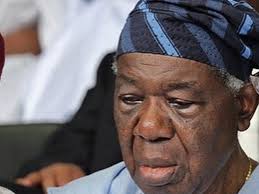Even if Chief Ernest Adegunle Oladeinde Shonekan had not been drawn directly into the murky and tricky cauldron of national politics, he would still stand as an important figure in the history of Nigeria. He was, for more than a decade, the chairman and chief executive of the UAC conglomerate, a business with interests in a wide range of sectors, and which worth as a group rivaled the annual budget of some African countries. Anyone who could sit atop the huge and complex UAC in the dual capacities of chairman of the board of directors and chief executive was reasonably good to run Nigeria. All things considered, Shonekan exhibited themark of a patriot. Urbane titan and champion of Nigeria’s private sector, the Abese of Egbaland, and former head of Nigeria government who died on January 11, 2022 at age 85, was a patriot.
As executive chairman of a business colossus, Shonekan didn’t just happen. He attended reputable schools –CMS Grammar School, Lagos, University of London where he took a law degree in 1962, and Harvard Business School. So educationally grounded, he was employed assistant legal adviser by UAC in 1964. Surely, competence, steadfastness, and patience stood him in good stead to steadily rise through the ranks. At age 40 he was on the board of directors.
In 1980, he attained the topmost position in the group of companies.
Despite his efforts, Abacha, driven by naked ambition, seized power on November 17, 1993. Opinion was rife that, all along, Shonekan was a mere pawn in the game of the military saddled with a bobby-trapped contraption of a government.
Shonekan might be a ‘guru’ in the world of business; placed in the arena of Nigerian politics with despicable and unrepentantly self-seeking players, he was not exactly found wanting. But he certainly didn’t cope well – and for quite understandable reasons. In the business world, he came, he saw, he conquered; in the world of national politics, he came, he saw, did his best. But that was not at all good enough for his country. Certainly, not by the private sector standards that he helped to set. It is regrettable that he did not document for posterity his experience in government.
Should he have accepted Babangida’s offer? Could he have served Nigeria in a different and more effective capacity? The answers to these are anyone’s guess. Could the chief have done things differently? Possibly so; for he should have seen through Babangida’s ‘dark agenda,’ to borrow the phrase of respected columnist Olatunji Dare. Shonekan could have rejected the general’s invitation into government. He, however, accepted. There is no denying that the road taken-or not taken- has made a huge mark on Shonekan’s name and reputation. Nonetheless, his zeal as a patriot was undeniable.
